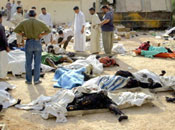 |
You want to read another story on Iraq like you want a root canal. We are all, Arabs, Americans, Europeans and others, burned out on the war there. What has happened in that ancient land, four years on after the invasion, is now a repetitive story with no happy ending in sight, a story about the dissolution of an Arab nation, the dilution of its culture and the tearing asunder of its society.
A Niagra of books, feature stories, news reports and documentaries has been released, and somewhere along the line we just stopped paying attention to any of them. What is there new to say about the blood-letting by Iraqis against their fellow Iraqis, and about how Washington's excuse for going to war in the first place was too glib by half? It's been repeated over and over again to the point of litany.
These days we read, as we did early this week, that "twin truck bombings killed dozens of people in the northern Iraqi city of Tall Afar, in the deadliest of several attacks across the country on Tuesday", and we turn away in nauseated disbelief. And we read, again as we did early this week, that General Barry McCaffrey, an influential figure in the Army, has released a dire assessment of the situation in the country, based on a recent round of meetings there with General David H. Petraeus and 16 other senior US commanders. "The population is in despair," he wrote in an eight-page document completed in his capacity as professor at West Point. "Life in many of the urban areas is now desperate."
Come, come now, Barry, any working class Iraqi running a lunch counter in Baghdad, or any one of the five million Iraqis who have already fled their homeland to seek refuge in the surrounding countries, would have told you that - and then some.
"Stuff happens", retorted flippantly the former secretary of defence Donald Rumsfeld when he heard the news about looters picking clean public buildings and museums in the Iraqi capital. "Bring it on", hollered President George W. Bush defiantly when asked what to do about the then nascent guerrilla uprising. "The insurgency," explained Vice-President Dick Cheney with a straight face as he addressed reporters, "is in its last throes". And, yes, let's not forget the other slogans that defined the dream world administration officials inhabited at the time, such as "failure is not an option", "Americans don't cut and run" and the rest of it.
As American leaders, including those neoconservative ideologues who had argued loudest for the war and were in fact its architects, continued to deny the bleak reality in Iraq, voices began to be raised by folks in the media, the world of academe and in think tanks about the futility of an imperial venture that had gone terribly, terribly awry. But not just among these folks, for any American newspaper reader with any serious claim to literacy began to fully grasp then the extent of that bleak reality, that imperial hubris in world affairs (a heady vision of power without end), as chauvinism in culture (one's national values are universal in their appeal and should be exported to lesser endowed peoples), is a suicidal option. And the Congressional elections proved that, with Democrats back in control of both chambers by 2007 and now poised to retake the White House next year.
Is there a lesson here for all of us? Unquestionably.
In the delicate enterprise of exporting freedom and democracy nothing is less free and democratic, and more brazen with hollow brutality, than a row of dictates to the recipient. The global dialogue of cultures is a living, useful dialogue between a big power and lesser nations only if that big power shows a two-fold respect: for the political maturity of its interlocutors (who are often, say in this case in Palestine, neither children nor retards) and, in a central way, for their sense of independence.
If we in our part of the world consider the dictates of a big power to be repugnant it is because we happen to believe that that big power's intellectuals, policy makers and political leaders are men and women no better than ourselves, their judgments no less fallible or open to dishonesty than ours.
After Palestine, where the US has danced with a corpse all these years; after Iraq, where it struck a dry well; and after Lebanon last summer, where it allowed the destruction of a country in order to rebuild it, one wonders.
Thus the present danger to our struggle for freedom, to the inward freedom of our societies in the Arab world, the struggle to make our dialogue with other cultures more exact and humane, does not derive merely from the verbal reticence imposed on our intellectual effusions by some repressive regime or another. The danger lies in the facile contempt the US, all these years, all these decades, has exhibited for Arab citizens, their culture, their human rights, their dreams, their core values.
Ask any Palestinian, any Lebanese, any Iraqi. Indeed, ask any Egyptian, any Algerian, any Syrian. What we have here, as Paul Newman would've told you in Cool Hand Luke, is a failure to communicate.
Fawaz Turki is a veteran journalist, lecturer and author of several books, including The Disinherited: Journal of a Palestinian Exile. He lives in Washington D.C.